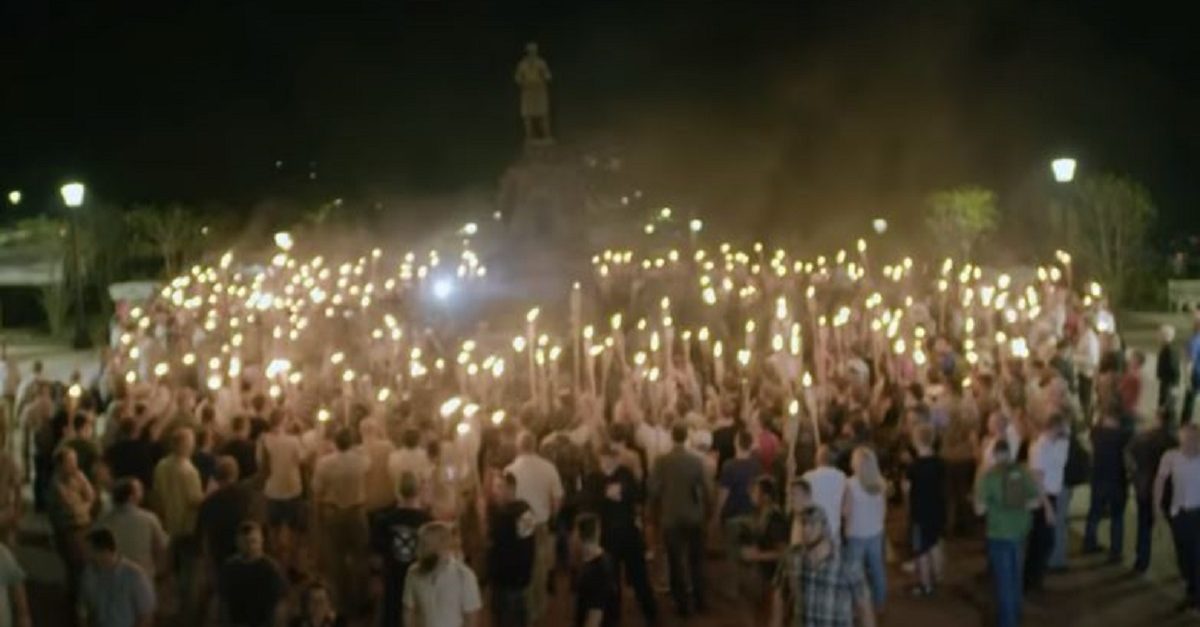
A gathering at the “Unite the Right” rally in Charlottesville, Va., appears in an HBO screengrab.
A federal jury has returned a $31.8 million civil verdict in a case connected to the “Unite the Right” protest in Charlottesville, Va., in Aug. 2017. A collection of nine plaintiffs sued a number of figures in the alt-right movement — including Jason Kessler, Matthew Heimbach, Richard Spencer and Christopher Cantwell — on a series of federal and state law claims. The jury deadlocked on the federal claims but returned verdicts on the state law claims in various dollar amounts.
The New York Times described the defendants generally speaking as “a mix of white nationalists, neo-Nazis and Confederate sympathizers.” For instance, Cantwell, known as the “Crying Nazi,” was sentenced to prison in February for extortion and a rape threat.
Legally, the jury agreed that a far-right conspiracy was afoot in Charlottesville — one which resulted in legally cognizable tort injuries.
According to the instructions presented to the jury, the plaintiffs alleged a series of state and federal claims: (1) a conspiracy to commit racially motivated violence in violation of 42 U.S.C. § 1985(3); (2) failure to prevent that conspiracy in violation of 42 U.S.C. § 1986; (3) civil conspiracy under Virginia state law; (4) engaging in racial, religious, or ethnic harassment or violence under Virginia Code § 8.01-42.1; (5) assault and battery; and (6) intentional infliction of emotional distress.
Not all of the plaintiffs alleged all of the counts against all of the defendants. The jury deadlocked on the first two counts. It agreed that the plaintiffs proved the third, fourth, fifth, and sixth claims but assigned no dollar amount in damages on one portion of the fourth claim attributed to “avowed neo-Nazi” James Alex Fields, Jr., who plowed a car through a crowd in Charlottesville and killed Heather Heyer. The jury did award at least $13.5 million in damages against Fields in other areas of the case, however. Fields was convicted and sentenced criminally to life in prison plus 419 years, making his ability to pay the full value of damages assigned against him dubious at best.
Four of the plaintiffs were injured in the car attack perpetrated by Fields, the New York Times noted. “In addition to their physical injuries from the crash, including three concussions and a skull fracture, the plaintiffs testified that they suffered from post-traumatic stress disorder, including insomnia, the inability to concentrate, flashbacks and panic attacks,” the Times said.
Significant chunks of the jury’s award were earmarked as compensatory damages. Those are damages designed to compensate the plaintiffs for actual losses or for injuries caused by the defendants. However, the most significant awards were tallied as punitive damages. Those are amounts designed to punish the defendants for conduct the jury believed was worthy of monetary sanctions. Predictably, several of the defendants immediately moved to reduce the punitive damage awards pursuant to Virginia law, court records indicate. Virginia law caps total punitive damages awarded against all defendants at $350,000, but juries are not told of the statutory cap before they render verdicts. The punitive damages are thus poised to be reduced considerably by the court regardless of the dollar amounts the jurors wrote on the form.
Despite the fact that the jury deadlocked on the federal counts, attorneys for the plaintiffs reacted gleefully to the verdict as a whole.
“We are thrilled that the jury has delivered a verdict in favor of our plaintiffs, finally giving them the justice they deserve after the horrific weekend of violence and intimidation in August 2017,” CNN quoted plaintiffs’ attorneys Roberta Kaplan and Karen Dunn as saying. “Today’s verdict sends a loud and clear message that facts matter, the law matters, and that the laws of this this country will not tolerate the use of violence to deprive racial and religious minorities of the basic right we all share to live as free and equal citizens.”
The defense, however, was pleased that the federal counts resulted in disagreement among members of the jury.
“I consider a hung jury to be a win, considering a disparity of resources,” attorney Joshua Smith said, again per CNN. Smith represents three of the defendants.
The jury’s verdict form is below; it explains the dollar amounts awarded.